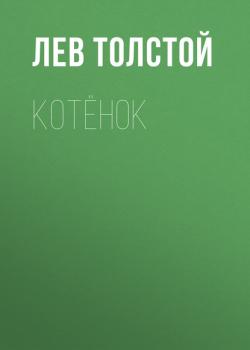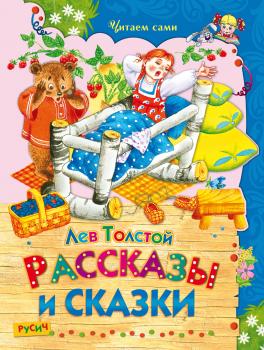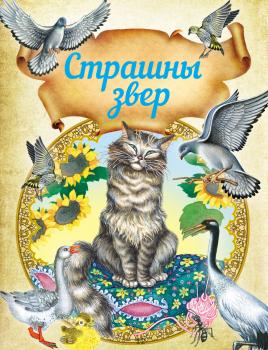ТОП просматриваемых книг сайта:
Лев Толстой
Список книг автора Лев ТолстойАннотация
«…Одна девочка ушла из дома в лес. В лесу она заблудилась и стала искать дорогу домой, да не нашла, а пришла в лесу к домику. Дверь была отворена; она посмотрела в дверь, видит: в домике никого нет, и вошла. В домике этом жили три медведя. Один медведь был отец, звали его Михайло Иванович. Он был большой и лохматый. Другой была медведица. Она была поменьше, и звали ее Настасья Петровна. Третий был маленький медвежонок, и звали его Мишутка. Медведей не было дома, они ушли гулять по лесу…»
Аннотация
The Death of Ivan Ilyich – first published in 1886, is a novella by Leo Tolstoy, considered one of the masterpieces of his late fiction, written shortly after his religious conversion of the late 1870s. "Usually classed among the best examples of the novella", The Death of Ivan Ilyich tells the story of a high-court judge in 19th-century Russia and his sufferings and death from a terminal illness. Ivan Ilyich (Ilyich is a patronymic, his surname is Golovin) is a highly regarded official of the Court of Justice, described by Tolstoy as, «neither as cold and formal as his elder brother nor as wild as the younger, but was a happy mean between them—an intelligent, polished, lively, and agreeable man.» As the story progresses, he becomes more and more introspective and emotional as he ponders the reason for his agonizing illness and death.
Аннотация
"God Sees the Truth, But Waits" is a short story by Russian author Leo Tolstoy first published in 1872. The story, about a man sent to prison for a murder he didn't commit, takes the form of a parable of forgiveness. English translations were also published under titles «The Confessed Crime» and «Exiled to Siberia». The concept of the story of a man wrongfully accused of murder and banished to Siberia also appears in one of Tolstoy's previous works, War and Peace, during a philosophical discussion between two characters who relate the story and argue how the protagonist of their story deals with injustice and fate. Ivan Dmitrich Aksionov is a merchant living in Vladimir, a town in Russia. Although Aksionov is prone to drinking, he is not violent, and he is responsible and well liked by people that know him. One day he decides to go to a fair as a business venture, but his wife pleads for him not to go because of a nightmare she had the previous night in which he had greyed hair. Aksionov disregards his wife's dream and leaves for the fair… Famous works of the author Leo Tolstoy: War and Peace, Anna Karenina, The Death of Ivan Ilyich, The Kingdom of God Is Within You, Resurrection.
Аннотация
A Russian Christmas Party by Leo Tolstoy is about a generous family on the brink of ruin whose mother pins their hopes for restoring their fortune on their son, Nicolas' marriage to a wealthy bride. Nicolas isn't cooperating, for he loves a poor girl named Sonia. Alas! How will they see it through? The Christmas stories of the famous authors: Gilbert Keith Chesterton – A Christmas Carol, Lucy Maud Montgomery – A Christmas Inspiration, A Christmas Mistake, Christmas at Red Butte, Lyman Frank Baum -A Kidnapped Santa Claus, Mark Twain – A Letter from Santa Claus, Louisa May Alcott – A Merry Christmas, Leo Tolstoy – A Russian Christmas Party, Henry Wadsworth Longfellow – Christmas Bells, Nikolai Gogol – Christmas Eve, William Dean Howells – Christmas Everyday, Joseph Rudyard Kipling – Christmas in India, Lyman Frank Baum – Little Bun Rabbit, Elizabeth Harrison – Little Gretchen and the Wooden Shoe, John Milton – On the Morning of Christ’s Nativity, Charles Dickens – The Chimes, Nathaniel Hawthorne -The Christmas Banquet, Hans Christian Andersen – The Fir Tree, Selma Lagerlöf – The Holy Night, Hans Christian Andersen – The Little Match Girl, Clement Moore – The Night Before Christmas, Henry van Dyke – The Other Wise Man, William Dean Howells – The Pony Engine and the Pacific Express, Beatrix Potter – The Tailor of Gloucester, Henry Wadsworth Longfellow – The Three Kings, Anton Chehov – Vanka.
Аннотация
In «A Letter to a Hindu», Tolstoy argued that only through the principle of love could the Indian people free themselves from colonial British rule. These ideas ultimately proved to be successful in 1947 in the culmination of the Indian Independence Movement. In 1908, Indian revolutionary Taraknath was wrote to Leo Tolstoy, by then one of the most famous public figures in the world, asking for the author’s support in India’s independence from British colonial rule. On December 14, Tolstoy, who had spent the last twenty years seeking the answers to life’s greatest moral questions, was moved to reply in a long letter, which was published in the Indian newspaper Free Hindustan. Passed from hand to hand, the missive finally made its way to the young Mahatma Gandhi, whose career as a peace leader was just beginning in South Africa. He wrote to Tolstoy asking for permission to republish it in his own South African newspaper, Indian Opinion. Tolstoy’s letter was later published in English under the title A Letter to a Hindu.
Аннотация
«Были брат и сестра – Вася и Катя, у них была кошка. Весной кошка пропала. Дети искали ее везде, но не могли найти…»
Аннотация
Сборник рассказов и сказок Л. Н. Толстого с красочными иллюстрациями для детей дошкольного и младшего школьного возраста. Для самостоятельного чтения с 7-ми лет.
Аннотация
Добрыя цікавыя казкі і апавяданні Л. М. Талстога і К. Дз. Ушынскага пражывёл і птушак.










